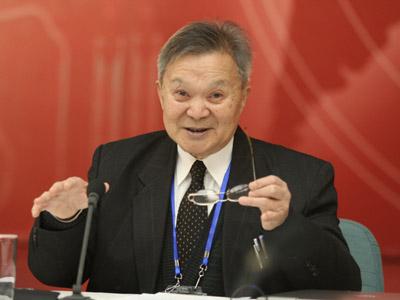Enthusiasm for Chinese on the rise in India
- By Wu Jin
 0 Comment(s)
0 Comment(s) Print
Print E-mail China.org.cn, February 19, 2014
E-mail China.org.cn, February 19, 2014
Tan Zhong, a Chinese-Indian bilingual educator in Indian universities, including the India National Defense College, University of Delhi and Jawaharlal Nehru University, told the Global Times (Chinese) that the Indian people have become increasingly interested in learning Chinese in recent years, thanks to booming bilateral trade and exchanges.
|
Tan Zhong, a Chinese-Indian bilingual educator in Indian universities. [File photo] |
Global Times: Was the Indian public enthusiastic about learning Chinese in the 1950s when there was a honeymoon period in bilateral relations between China and India?
Tan: Despite the frequent exchanges between China and India, not many Indians were learning the language. But when the border conflict between the two countries started in 1962, Indians began to realize that they should study and understand China. They were under the influence of the U.S.' promotion of the theory of “precise knowledge of the self and the threat that leads to victory” from Sun Tzu's Art of War (a classic work of military strategy in ancient China).
When the University of Delhi started offering Chinese classes in 1964, I helped recruit students. At that time, the class could only take 30 to 40 students, but there were hundreds of applicants. Shivshankar Menon, the incumbent Indian National Security advisor was one of the students in the third phase. But the class was really short of teachers, as only my wife and I worked there. Later, when I took up a post at Jawaharlal Nehru University in 1979, there were no textbooks. So I had to borrow out of date copies of the People's Daily for reference.
Global Times: Is it easy for Chinese learners to find jobs in India?
Tan: In the past, most Chinese majors could not find a job. Therefore, they would continue their study for a master's degree. If that degree failed to get them a job, they would carry on to study for a Ph.D.
But now the reason for the popularity of Chinese has fundamentally changed. [Instead of a strategic demand], the increasing bilateral exchanges among the two peoples are sparking the Indian people's enthusiasm for learning Chinese. The number of Chinese tourists visiting India has continued to rise, and many Indian students who are learning Chinese obtain job offers even before they graduate.
Global Times: What is most difficult thing about teaching sinology in India?
Tan: Language should be learned in real life. But in most of the universities, the foreign language departments focus on literature. If Indian students have a Chinese teacher, they can improve their pronunciation a lot. There were two native Chinese speakers teaching Indian military officials in Jawaharlal Nehru University, but when they left, the school found no substitutes. The Indian officials taught Chinese all by themselves. But the language they taught was so heavily accented that when I went to the border as a translator I could hardly understand what the officials were talking about.
Global Times: What is the difference between Chinese and Indian scholars when they study each other's countries?
Tan: Indian scholars who are often straightforward in expressing their viewpoints have paid significant attention to the study of China and their research is always solid and convincing.
However, Chinese scholars' research on India is generally superficial. Many of them write articles by quoting one or two sentences from books, and few of them are willing to deepen their research by covering a substantial number of documents. Yet more than once, the sentences they quote may be wrong or a reversal of the facts.
We have had scholars on Indian culture and history, but now many are choosing politics or diplomacy. To be a real scholar, we should think about what the real problems between China and India are and how to improve bilateral relations.
Follow China.org.cn on Twitter and on Facebook to join the conversation.







Go to Forum >>0 Comment(s)